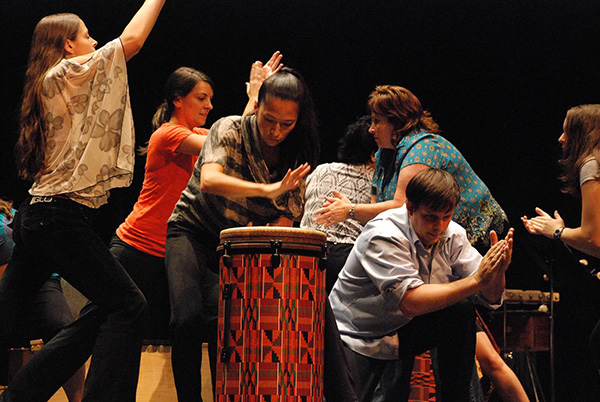Teaching music to children in our schools can be as challenging as it is rewarding. Even the most experienced, well-grounded instructor needs a little boost now and then. Whether its finding new inspiration for the classroom, attaining Certification to further a career, gaining Graduate credits towards a degree, earning Recertification points for a school district, or a mix of any of the above – elementary and middle school music teachers can get “transformed” through the Orff Schulwerk Teacher Education experience at George Mason University in Fairfax, VA.
What is Orff Schulwerk? According to the Orff methodology, through singing, rhythmic speech, body percussion and movement, children gain experience and develop instincts for making music in a joyful and accessible way. Orff Schulwerk uses songs, rhymes, games and dances to explore traditional and original music in the elemental style, introducing skills and concepts in a logical and integrated way. The Orff program at Mason is approved by the American Orff Schulwerk Association.
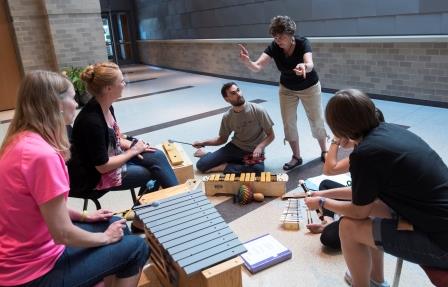
ORFF CERTIFICATION LEVELS COURSES July 18-29, 2016
“Music teachers – now is the time to start (or continue) your work in Orff Schulwerk!” exclaims Program Director Donna Fleetwood. “Begin your journey with Orff Schulwerk this summer and take creative ideas back to the classroom this fall. Or, continue the good work you have begun by taking the next Level while skills and concepts are fresh. Expand your learning among supportive instructors and peers who will become life-long colleagues.”
Mason offers Levels I, II and III, taught by an outstanding faculty, including: Joyce Stephansky and Donna Fleetwood (Level I), Matt McCoy and Betsy Kipperman (Level II), Steven Calantropio (Level III), John Crandall (Recorder), and Victoria Redfearn-Cave (Movement).
See Faculty Bios
Participants spend two action-packed weeks in lectures, discussions, demonstrations, and hands-on applied activities, culminating in a final sharing presentation on the last Friday, involving music, rhythm and movement. Participants who successfully complete Level III are awarded the Certification in Orff Schulwerk as regulated by the American Orff Schulwerk Association.
SEE FULL CERTIFICATION PROGRAM DETAILS
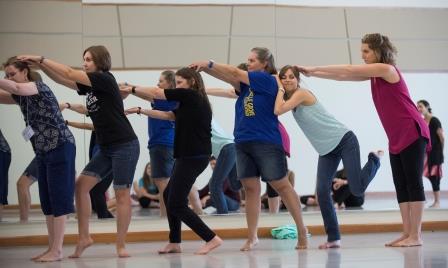
ORFF SUPPLEMENTAL COURSES July 11-15, 2016
Exciting one week supplemental courses, which occur the week prior to the Levels courses, are designed to enrich and enhance the Orff experience, as well as introduce emerging techniques. Whether it’s an introduction or a “next step”, these courses give teachers an opportunity to expand their knowledge and invigorate their teaching methods.
“To enhance your work in Orff Schulwerk,” says Donna Fleetwood, “take a course that develops confidence and expertise in the Orff Schulwerk approach.”
- Master Class in Orff Schulwerk with Steve Calantropio: This highly anticipated class promises to be a capstone experience for those who have completed Level III and wish to extend their studies of elemental music and style with a leading expert in Orff Schulwerk practice. Take away exciting ideas for the classroom and an expanded view of Orff Schulwerk.
“The course massively stretched my musicianship,” said one past participant.
“The instructor was extremely well prepared and knowledgeable,” said another. - Rhythmic Training for Elementary and Middle School Teachers with Jim Solomon: Always a popular class for those who wish to develop skills in drumming and un-pitched percussion while learning rhythmic techniques for teaching and creating in a highly motivated environment.
“I came in scared of rhythm and feeling like I wouldn’t do well, but I’m leaving feeling empowered and confident,” said a former student.
“It has solidified and expanded the teachings of the Orff Levels,” said another. - Elemental Drama Collective with Donna Fleetwood and Bonny Tynch: Discover how an Elemental Drama approach can lead to seamless teaching while preparing to showcase student creativity and skill. The focus is on Orff Schulwerk teachers working collaboratively with peers and with children. This year, the time is extended for more strategies, materials and peer interaction.
“It was very rewarding working with actual students throughout the week,” said one enthusiastic participant, “and being able to see their transformation as they became more and more comfortable sharing their ideas and getting involved in the creative process.”
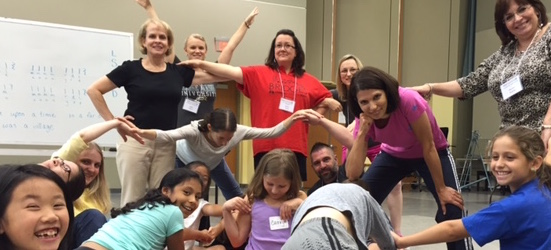
“Now is the time to challenge yourself with something new!” advises Ms. Fleetwood.
- Eurhythmics Level I, American Eurhythmics Society Certification: New this year, by popular demand, Mason is offering a class in Eurhythmics. This Dalcroze-inspired class enables participants to develop eurhythmic and improvisational skills. Dr. Todd Anderson takes your music and movement training to a new level with a one-week intensive class, and the option to continue with additional support in an online course in the fall. Students are encouraged to progress at their own pace after the intensive one-week course towards American Society of Eurhythmics Certification. Date exception: July 18-22
“Experiencing Eurhythmics has opened my mind to an entirely new perspective on music education,” stated Maria Franzini, a MM in Piano Pedagogy/Performance at George Mason. “The approach has taught me to observe students and base lessons on their interests and capabilities. It has freed my own body to be more expressive and my mind to be more creative. All this results in greater involvement in and enjoyment of music from students.” - Laban Applications for the Music Teacher, Part II with Dr. Lisa Billingham: Continue the study of the Laban Movement Theory as it applies to the classroom and everyday life. Movement exercises, actively coached conducting gestures, and an option to conduct peers in a recital venue, add to your kinesthetic toolbox and to your life!
“Having Laban language and full-body movement exercises informs conducting gestures in a way that helps remove superfluous movements from showing the music,” said Michael Wu. “Laban’s choreography helps conductors understand their bodies in the context of a dance.”
“Because of [Laban Applications Part I], I was able to help transform the sound of my young instrumentalists and help them perform with more musical nuance,” said Nathan Sorensen. “This is a class that I would recommend to any musician, whether they perform in the Band, Orchestra, or Choir.”
- Conversational Solfege with Rachel Grimsby: Continues the study in the Feireabend approach at Mason with a focus on, strategies, materials and curriculum. Certification in Feierabend Association for Music Education (FAME) can be earned upon completion of the class.
- Alexander Technique for Music Teachers with Robbin Marcus: Learn new ways to adjust to the physical and mental demands of music teaching. Those who conduct, play an instrument and perform a myriad of classroom activities, gain deep structural support and develop an increased physical awareness.
- Brush Up Your Kodaly with Robbin Marcus and Ivy Rawlins Ward: Expands skills and repertoire in Kodaly through dulcimer playing and the beloved music and singing games of the Ritchie Family. Ivy Rawlins Ward’s invigorating sessions brush up solfege skills. Take back new materials, a new instrument to play and sharpened skills.
“Robbin’s vast experience and knowledge of contra dance & play party dances was thrilling,” said one former participant. “She has inspired me to find time to dance more with my students.”
“Ivy really challenged us to a new level of musicianship for ourselves,“ said another.
SEE FULL SUPPLEMENTAL COURSE DETAILS
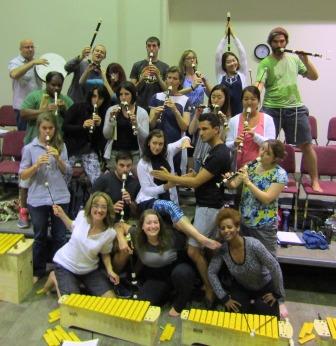
“Now is the time to sign up and reserve your spot.” says Donna Fleetwood. “On-campus housing options are also available to reserve up to April 14th. Bring in the 2016-17 school year with a renewed vision and refreshed vigor!”
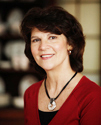
SEE ALL TEACHER TRAINING OPTIONS

